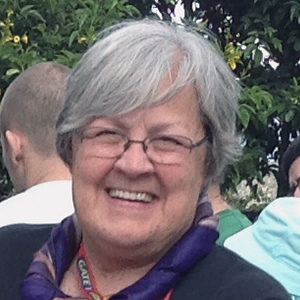Nearly five years passed following her graduation from Blackburn College, and Nancy Roberts was working for Pfizer in its East St. Louis plant—one of the last major corporations in the beleaguered city. That was when she realized that her career path was leading to operations management and that her experiences at Blackburn had made a difference.
While at Pfizer, Roberts took a career development workshop that used the book What Color Is Your Parachute by Richard N. Bolles as its study guide. The workshop led her to think deeply about what she liked to do. Throughout her college career and later she struggled with what direction she wanted to go. The seminar “helped me to wrap my mind around the idea that understanding what I liked to do should determine the work I do.”

As Nancy reflected on her time at Blackburn, her list of likes included her love for playing basketball and her management work as head of the kitchen’s salad room. She also enjoyed earlier participation in a high school musical. Common characteristics existed among these disparate activities: they were challenging endeavors, had specific objectives, and required teamwork. That insight led her into operations management, which required the skill sets developed in all of those categories and became something she enjoyed throughout her successful career.
“When I was the head of the salad room at Blackburn, and then in my management jobs at Pfizer and Sonoco, I tried to make things clearer and more understandable for my employees without being capricious or sounding like it was simply a manager’s decision. I wanted them to know that there was an organizational reason for why they were asked to do certain things; that there was a bigger picture to look at.”
Roberts wanted her employees to understand, for example, that working on the weekend serves a broad “community-based” purpose. “Our customers needed our inventory so they could get their products finished and out the door to their own customers. We were part of a process chain or network. Management decisions were based on circumstances—not on a manager’s whim.”
Nancy’s last assignment before retiring was a challenge she accepted and for which she was given the time and resources necessary to resolve a cost overrun problem. The plant had $2 million in costs it should not have, and she was directed to bring the costs under control. She used much of her time to educate employees about their work and to know that their work had value. She helped them realize that some practices—in place for years—were not cost-effective.
PHILANTHROPY: GIVING IT BACK…
Professional success led to Nancy thinking about ways she could give back. She met an older, wealthy couple whose gifts were making a significant impact on an area college. During a seminar that Nancy attended, the couple gave a presentation on their philanthropic plans. Nancy was impressed with the planning and thought that went into their gifts and the amount of time the couple spent meeting with the school’s representative.
“Blackburn attracts and educates the kind of kids that I wanted to hire while I was at Sonoco,” said Roberts. “They are creative, have a good work ethic, a can-do attitude, and are motivated employees. They have good skill sets, though they sometimes do not realize it.
“I believe Blackburn works hard to make college affordable and makes higher education possible for many students with financial need. I wanted to supplement the students’ ability to pay in some way. It was a natural fit for me to work with Blackburn to set up a scholarship fund for students in memory of my partner Kathleen Eberle (’72).”
Thinking long-term, Nancy went on to set up a second scholarship in her own name that will be funded as part of her estate.
As Nancy considered other ways she could assist Blackburn and its students, she especially liked the idea of setting up a speakers’ series on the campus in the social sciences. Modeled on a natural sciences speaker series, she wanted students to be exposed to ideas from off the campus and provide a chance for them to talk with professionals from the social sciences fields. She wanted to expose students to work being done in social justice and justice-related problems. Nancy hopes that as the speakers’ series grows it will build a desire among potential speakers to come to the campus to give lectures and spend time with students.
“I enjoyed working with the staff at Blackburn who helped me put into action my desire to give back to Blackburn. With their help, I was able to align my interests with the College’s programs and find opportunities to give back in ways that best fit the mission of educating their students.”
It has been a long and productive road for Nancy Roberts since her days living on the third floor of Stoddard hall, majoring in sociology, working in the kitchen, and playing sports. She found a life partner there and developed work and life skills that would contribute to her many later achievements. Paying it back with her gifts to Blackburn is making a difference for Blackburn—and for her.
